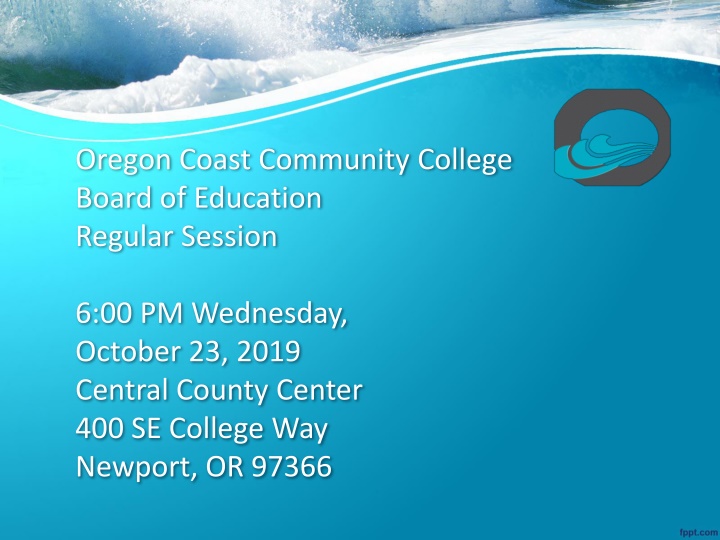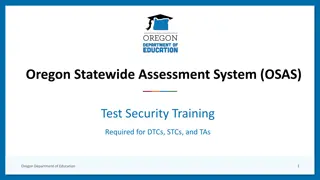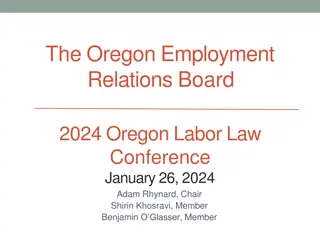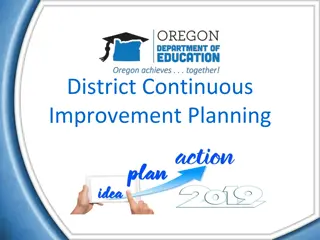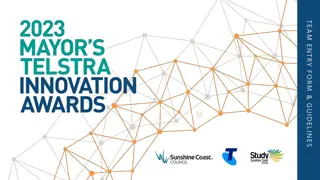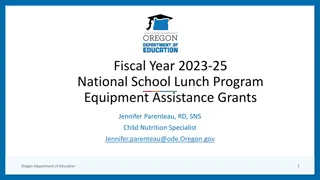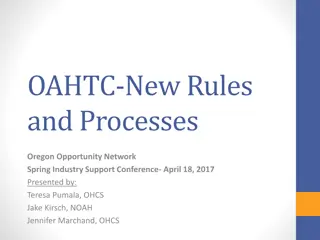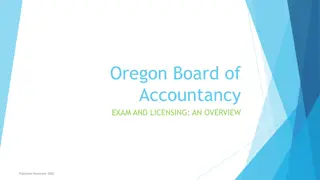Oregon Coast Community College Board of Education Regular Session
The Oregon Coast Community College Board of Education had a regular session discussing draft commendations and recommendations for various areas such as performance evaluation, Title IV compliance, technology plan, fiscal practices, and strategic planning. They focused on improving educational pathways, student services, emergency preparedness, and fiscal sustainability. The board also outlined goals for core theme planning, resource allocation, and institutional capacity development. These recommendations aim to enhance the overall educational experience and outcomes for students.
Download Presentation

Please find below an Image/Link to download the presentation.
The content on the website is provided AS IS for your information and personal use only. It may not be sold, licensed, or shared on other websites without obtaining consent from the author.If you encounter any issues during the download, it is possible that the publisher has removed the file from their server.
You are allowed to download the files provided on this website for personal or commercial use, subject to the condition that they are used lawfully. All files are the property of their respective owners.
The content on the website is provided AS IS for your information and personal use only. It may not be sold, licensed, or shared on other websites without obtaining consent from the author.
E N D
Presentation Transcript
Oregon Coast Community College Board of Education Regular Session 6:00 PM Wednesday, October 23, 2019 Central County Center 400 SE College Way Newport, OR 97366
Draft Commendations (paraphrased from Exit Meeting) 1. Strong community and high school partnerships that advance the core theme of educational pathways. 2. Staff, faculty and administration create a climate that is cohesive, collaborative and welcoming of students, and maps student experiences through financial advising, multiple measures placement, mandatory advising, and math pathways. 3. Extensive emergency preparedness and continuity planning, including community partners in the work. 4. An extraordinary approach to student services. 5. Maintaining a 12.5% budget reserve and strong healthy fiscal practices.
Draft Recommendations 1. Assess and fully implement the Performance Evaluation Process (2.B.2, 2.B.3, 2.B.6) Continue to address Title IV compliance (Cleary Act) to fully be prepared for independence (2.D.2) Update and produce a Comprehensive Technology Plan (2.G.8) Integrate the Big 5 Strategic Plan (or its replacement) with Core Theme planning, document and present that planning effort with greater clarity to external observers. Develop purposeful plan for resource allocation and institutional capacity. (3A.1 & 3A.4) Continue implementation of the Service and Program Area Review (SPAR) process to complete a full five-year cycle. (4.B.1) Student Learning Outcomes, refine and implement multi-year cycles (4.A.3, 4.B.2) 2. 3. 4. 5. 6.
Recommendation Areas Candidacy: Spring 2018 Initial Accreditation: Fall 2019 Performance Evaluation Process (2.B.2, 2.B.3, 2.B.6) Continue to address Title IV compliance (Cleary Act) to fully be prepared for independence (2.D.2) Update and produce a Comprehensive Technology Plan (2.G.8) Fiscal Practices (2.F.1, 2.F.6) Integrate the Big 5 Strategic Plan (or its replacement) with Core Theme planning. Develop purposeful plan for resource allocation and institutional capacity. (3.A.1 & 3.A.4) Core Theme Planning (3B, 4A, 4B, 5A) Continue implementation of the Service and Program Area Review (SPAR) process to complete a full five-year cycle. (4.B.1) Learning Outcomes (4.A.3, 4.A.4, 4.A.5, 5A) Student Learning Outcomes, refine and implement multi- year cycles (4.A.3, 4.B.2) Governance & Evaluation (5B.2, 5B.3) Mission Fulfillment (5.A, 5.B)
